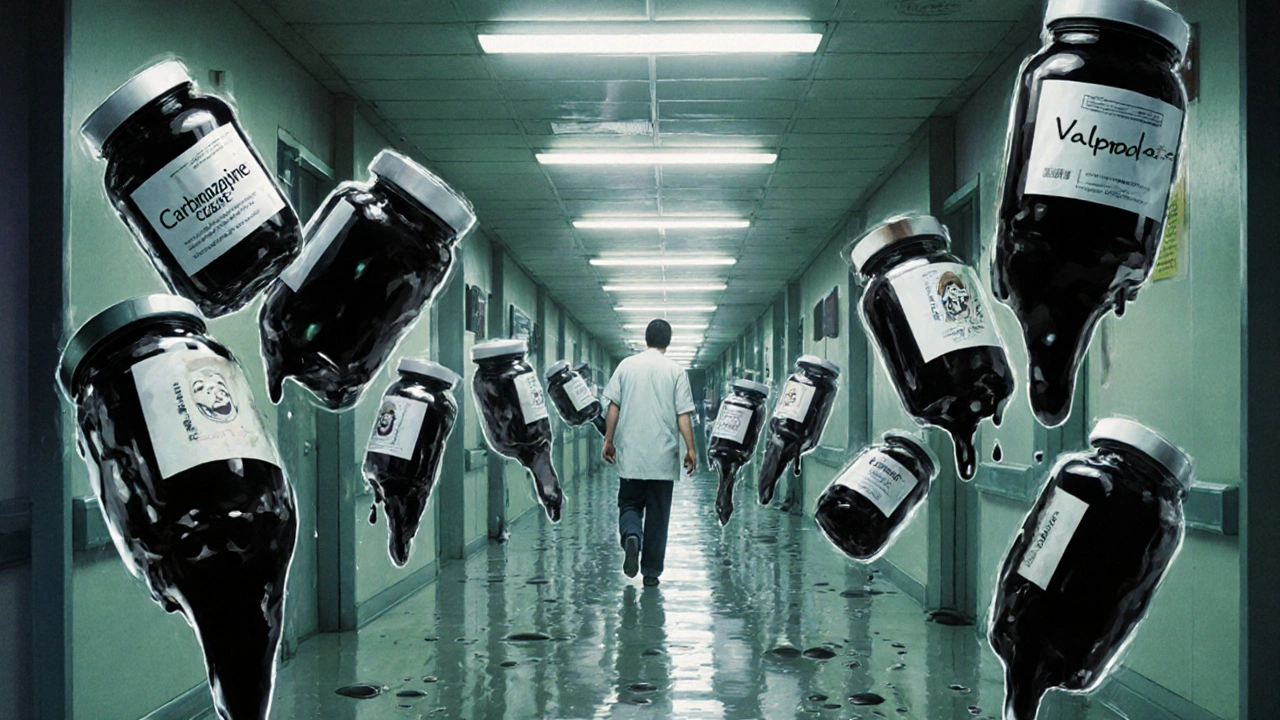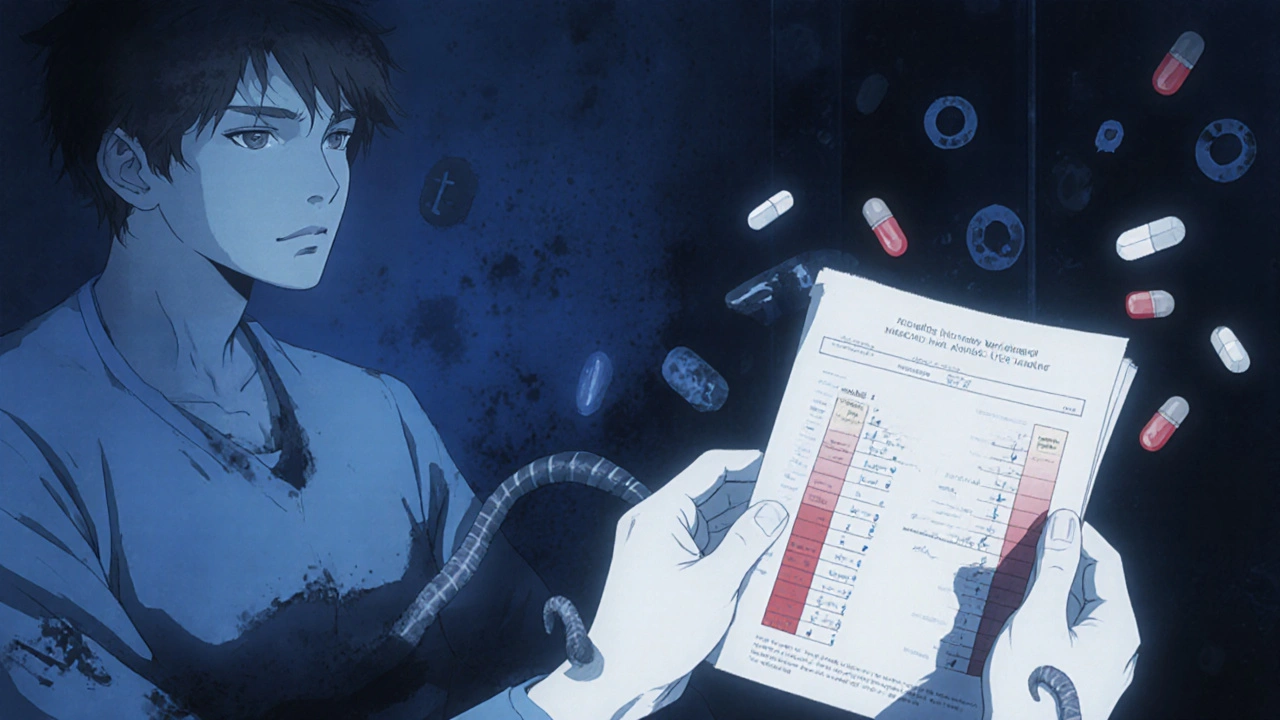When you're managing bipolar disorder, finding the right mood stabilizer isn't just about controlling highs and lows-it's about avoiding dangerous surprises. Lithium, valproate, and carbamazepine have been used for decades to stabilize mood, but they don’t play well with everything else in your medicine cabinet. A simple over-the-counter painkiller, a common blood pressure pill, or even another psychiatric drug can push levels into dangerous territory. These aren’t hypothetical risks. Real people end up in the hospital because of these interactions.
Lithium: The Delicate Balance
Lithium is one of the oldest mood stabilizers, but it’s also the most finicky. It doesn’t get broken down by the liver. Instead, your kidneys handle everything. That means anything that affects your kidneys or your sodium levels can change how much lithium stays in your body.
NSAIDs like ibuprofen or naproxen? They reduce kidney blood flow. That causes lithium to build up. One 2022 patient report on NAMI’s forum described going from a safe lithium level of 0.8 mmol/L to 1.3 after just three days of taking ibuprofen for a headache. That’s a 62% spike. Toxicity symptoms-tremors, confusion, nausea-can follow fast.
Diuretics are another silent danger. Thiazide diuretics, often prescribed for high blood pressure, cause your body to lose sodium. When sodium drops, your kidneys hold onto lithium instead of flushing it out. Studies show this can raise lithium levels by 25-40%. Many patients don’t realize their blood pressure med is the culprit until they start feeling off.
Even ACE inhibitors, common in diabetics and heart patients, can increase lithium levels by about 25%. The fix isn’t to stop these meds-it’s to monitor. The 2020 International Society for Bipolar Disorders guidelines say to check lithium levels 5-7 days after starting any new kidney-affecting drug. Keep your level at the lower end of safe range: 0.6-0.8 mmol/L. Hydration matters too. Dehydration from illness, heat, or not drinking enough can spike lithium fast.
Valproate: The Double-Edged Sword
Valproate (also called valproic acid or Depakote) works differently. It’s metabolized by the liver through three different pathways, which makes it less likely to be affected by one single drug. But that doesn’t mean it’s safe.
Its biggest danger is how it changes other drugs. When you add valproate to lamotrigine, a common mood stabilizer, lamotrigine levels can double or even triple. That’s not a minor adjustment-it’s a risk of serious skin rashes, including Stevens-Johnson syndrome. One Reddit user shared that switching from carbamazepine to valproate forced their lamotrigine dose down from 400mg to 200mg. Their neurologist confirmed: valproate was slowing down the breakdown of lamotrigine.
Valproate also binds tightly to proteins in your blood. When you take another drug that also binds to proteins-like warfarin or aspirin-it can push valproate off those proteins, making more of it free and active. That’s why levels need monitoring even if the dose hasn’t changed.
And then there’s the reverse: carbamazepine can reduce valproate levels by 30-50%. If you’re on both, your valproate might seem to stop working-not because your illness changed, but because carbamazepine is speeding up its metabolism. The British Association for Psychopharmacology recommends checking valproate levels when starting or stopping carbamazepine.
Carbamazepine: The Metabolism Transformer
Carbamazepine is the most aggressive player in this group. It doesn’t just interact-it rewires how your body processes other drugs. It’s a strong inducer of CYP3A4, the liver enzyme responsible for breaking down over half of all medications.
That means if you’re on carbamazepine, drugs like risperidone, haloperidol, and even birth control pills get broken down faster. One study found oral contraceptives become 50-70% less effective. That’s not just a risk for unintended pregnancy-it’s a risk for mood destabilization if you’re relying on hormonal regulation.
The most complex interaction is with valproate. For years, doctors thought valproate simply blocked the enzyme that breaks down carbamazepine’s active metabolite (CBZ-E). But research from 1999 showed it’s more than that. Valproate also blocks the next step-turning CBZ-E into a harmless waste product. The result? CBZ-E builds up, even if carbamazepine levels stay the same. CBZ-E is toxic. High levels cause dizziness, loss of coordination, and confusion.
When adding valproate to carbamazepine, guidelines recommend lowering the carbamazepine dose by 25% and monitoring CBZ-E levels. Target? Below 3.5 mcg/mL. Many clinicians miss this step. They check carbamazepine levels and think everything’s fine-until the patient starts stumbling or feeling foggy.

Why This Matters in Real Life
These aren’t just textbook cases. In a 2019 survey of 853 psychiatrists, 74% said carbamazepine-valproate interactions were “moderately to severely problematic.” Nearly half saw patients with clear signs of neurotoxicity-shaky hands, trouble walking, slurred speech-because CBZ-E spiked.
Lithium users aren’t off the hook either. A 2021 survey of 1,247 bipolar patients found 68% needed dose changes when starting diuretics. Over 20% had symptoms of lithium toxicity.
And yet, these interactions are often missed. Why? Because patients don’t always tell their psychiatrist about the ibuprofen they take for back pain. Or the blood pressure pill their primary care doctor added. Or the antibiotic prescribed for a sinus infection. Medication lists get messy. And many providers don’t have time to cross-check every new prescription.
That’s why you need to be your own advocate. Keep a written list of everything you take-prescriptions, OTC meds, supplements, even herbal teas. Bring it to every appointment. Ask: “Could this interact with my mood stabilizer?”
Monitoring Is Non-Negotiable
There’s no substitute for regular blood tests. Lithium levels should be checked every 3-6 months when stable, but immediately after any new medication is added. Valproate and carbamazepine levels need checking every 2-4 weeks when starting or changing doses, then every 3-6 months.
For carbamazepine, don’t just check the parent drug. Ask for the epoxide metabolite (CBZ-E). Many labs don’t offer it routinely, but if you’re on valproate too, it’s essential.
Use the LITH acronym taught in nursing programs: Level monitoring, Instruct about symptoms, Teach hydration, Hold if toxic signs appear. If you feel shaky, confused, nauseous, or have trouble walking-stop the new drug and call your doctor. Don’t wait.

What’s Changing in 2025
The landscape is shifting. Lithium prescriptions have dropped from 35% of new starts in 2012 to just 15% today. Valproate use has fallen too-mainly because of its risk to unborn babies. The FDA’s 2013 boxed warning on birth defects led to a 65% drop in prescriptions for women of childbearing age.
But new tools are emerging. The FDA approved an extended-release lithium citrate solution in 2022 to reduce spikes in blood levels. In Europe, a microbead version of valproate gives steadier absorption. And by 2027, genetic testing for CYP3A4 variants may become standard before starting carbamazepine. Early data from Mayo Clinic suggests this could cut adverse interactions by 30-40%.
Still, the core truth hasn’t changed: understanding how lithium (kidney-driven), valproate (multi-pathway liver), and carbamazepine (enzyme-inducing) behave differently is the foundation of safety. No new drug replaces the need for vigilance.
What to Do Next
If you’re on one of these drugs:
- Know your current blood levels. Ask your doctor for the exact numbers-not just “it’s in range.”
- Write down every medication, supplement, and OTC drug you take. Include vitamins, CBD, and herbal teas.
- Ask your pharmacist to run a drug interaction check every time a new prescription is filled.
- Don’t start NSAIDs, diuretics, or antibiotics without checking with your psychiatrist first.
- Know the warning signs: tremors, confusion, dizziness, nausea, unsteady walking.
- Keep a symptom journal. Note when you feel off and what changed in your meds that week.
These medications can save lives. But they demand respect. A single interaction can turn stability into crisis. Stay informed. Stay vigilant. And never assume a new pill is harmless just because it’s not a psychiatric drug.
Can I take ibuprofen if I’m on lithium?
It’s not recommended without close monitoring. Ibuprofen and other NSAIDs can increase lithium levels by 25-30%, raising the risk of toxicity. If you need pain relief, talk to your doctor first. Acetaminophen (Tylenol) is usually safer, but even that should be reviewed. Never start NSAIDs without checking your lithium level 5-7 days later.
Why does valproate make lamotrigine more dangerous?
Valproate blocks the liver enzyme (UGT) that breaks down lamotrigine. This causes lamotrigine levels to rise by 100-200%. High lamotrigine levels can trigger severe skin reactions like Stevens-Johnson syndrome. If you’re switching from carbamazepine to valproate, your lamotrigine dose must be cut in half-and your doctor should monitor you closely for rash.
Does carbamazepine affect birth control?
Yes. Carbamazepine speeds up the breakdown of hormones in birth control pills, patches, and implants. Studies show effectiveness drops by 50-70%. If you’re on carbamazepine and using hormonal contraception, you’re at high risk for unintended pregnancy. Use a non-hormonal method like an IUD or condoms. Talk to your doctor about alternatives.
Can I take both valproate and carbamazepine together?
Yes-but only with extreme caution. The combination can cause toxic buildup of carbamazepine’s metabolite (CBZ-E), leading to dizziness, confusion, and loss of coordination. If both are needed, your carbamazepine dose should be reduced by 25% when starting valproate. You’ll need regular blood tests for both drugs and CBZ-E levels. This combo is not first-line and should only be managed by a specialist.
How often should I get my blood tested on these medications?
For lithium: every 3-6 months when stable, but always within 5-7 days after starting any new medication that affects kidneys (NSAIDs, diuretics, ACE inhibitors). For valproate and carbamazepine: every 2-4 weeks when starting or changing doses, then every 3-6 months. If you’re on both valproate and carbamazepine, check CBZ-E levels too-target below 3.5 mcg/mL.
What are the early signs of lithium toxicity?
Early signs include fine hand tremors, increased thirst, frequent urination, mild nausea, and feeling unusually tired. As it worsens, you may get coarse tremors, muscle weakness, slurred speech, confusion, or dizziness. If you notice any of these, stop taking NSAIDs or diuretics, drink water, and contact your doctor immediately. Don’t wait for severe symptoms like seizures.
Is lithium still used today, or are newer drugs better?
Lithium is still considered one of the most effective drugs for preventing suicide and long-term mood episodes in bipolar disorder. While newer drugs like lamotrigine have fewer interactions, lithium remains unmatched in preventing mania. Its use has declined due to monitoring demands and side effects, but for many, it’s still the gold standard-especially when combined with careful management of drug interactions.


Jennifer Bedrosian
November 6, 2025 AT 13:03Lashonda Rene
November 8, 2025 AT 09:49Andy Slack
November 8, 2025 AT 19:28Rashmi Mohapatra
November 8, 2025 AT 20:15Abigail Chrisma
November 9, 2025 AT 22:39Ankit Yadav
November 11, 2025 AT 04:24Meghan Rose
November 11, 2025 AT 22:06Steve Phillips
November 13, 2025 AT 14:04Rachel Puno
November 15, 2025 AT 04:06Clyde Verdin Jr
November 16, 2025 AT 09:54Key Davis
November 17, 2025 AT 03:12Brad Seymour
November 17, 2025 AT 10:36Malia Blom
November 18, 2025 AT 05:00